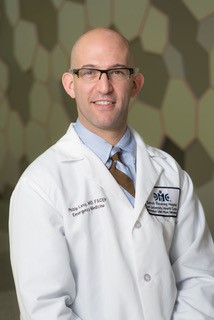Phillip Levy, M.D., M.P.H., assistant vice president of Translational Science and Clinical Research Innovation for Wayne State University, has been appointed to the newly created position of chief innovation officer of the Wayne State University Physician Group.
Charles Shanley, M.D., president and chief executive officer of WSUPG, announced the appointment Jan. 7.
“Dr. Levy will use his unparalleled knowledge, experience and connections to champion the creation of a Clinical Translation Command Center for Population Health Accountability at our 400 Mack headquarters in Midtown Detroit,” Dr. Shanley said. “This Command Center will develop and coordinate novel community-based ambulatory health interventions; integrated and team-based care delivery models; and groundbreaking, population-based clinical accountability and reimbursement strategies. Working in partnership with Wayne State and other regional health partners, our vision is that 400 Mack will become an epicenter for population health innovation and measurable health outcomes.”
Translation Command Center for Population Health Accountability at our 400 Mack headquarters in Midtown Detroit,” Dr. Shanley said. “This Command Center will develop and coordinate novel community-based ambulatory health interventions; integrated and team-based care delivery models; and groundbreaking, population-based clinical accountability and reimbursement strategies. Working in partnership with Wayne State and other regional health partners, our vision is that 400 Mack will become an epicenter for population health innovation and measurable health outcomes.”
Dr. Levy, he said, “is uniquely qualified to provide strategic leadership in the development and implementation of innovative disease prevention and ambulatory care delivery, and monitoring strategies to enhance community wellness, improve ambulatory care access and outcomes, and reduce health disparities.”
The Edward S. Thomas Endowed Professor and associate chair for Research in the WSU Department of Emergency Medicine, Dr. Levy is the principal investigator for Wayne State University’s Population Health OutcomEs aNd Information eXchange, or PHOENIX project. PHOENIX is a fully-integrated information technology platform that combines comprehensive patient-level health information from the Michigan Health Information Network with a broad range of social determinant and health disparities data. The platform was created to enable researchers, foundations, funders and community members to identify novel intervention targets and track outcome results down to ZIP code or even neighborhood levels.
PHOENIX aligns with Dr. Levy’s role as physician champion for the Michigan Department of Health and Human Services Heart Disease & Stroke Prevention Unit, where he leads a U.S> Centers for Disease Control and Prevention-funded initiative that leverages emergency departments as population health centers, focusing on improving blood pressure, glucose and cholesterol control.
“One of the ways that WSUPG can make a difference in metropolitan Detroit, our state and the nation is by establishing itself as a leader in population health innovation, clinical outcomes, social accountability and reimbursement strategies,” Dr. Shanley said. “By combining our unique academic expertise and long-standing commitment to urban health, WSUPG is particularly well-positioned to redefine the way we provide care by better managing longitudinal risk factors, including social determinants of health, and improving how we deliver preventive care and chronic disease management in ambulatory settings, as well as hospital-based tertiary and quaternary care.”